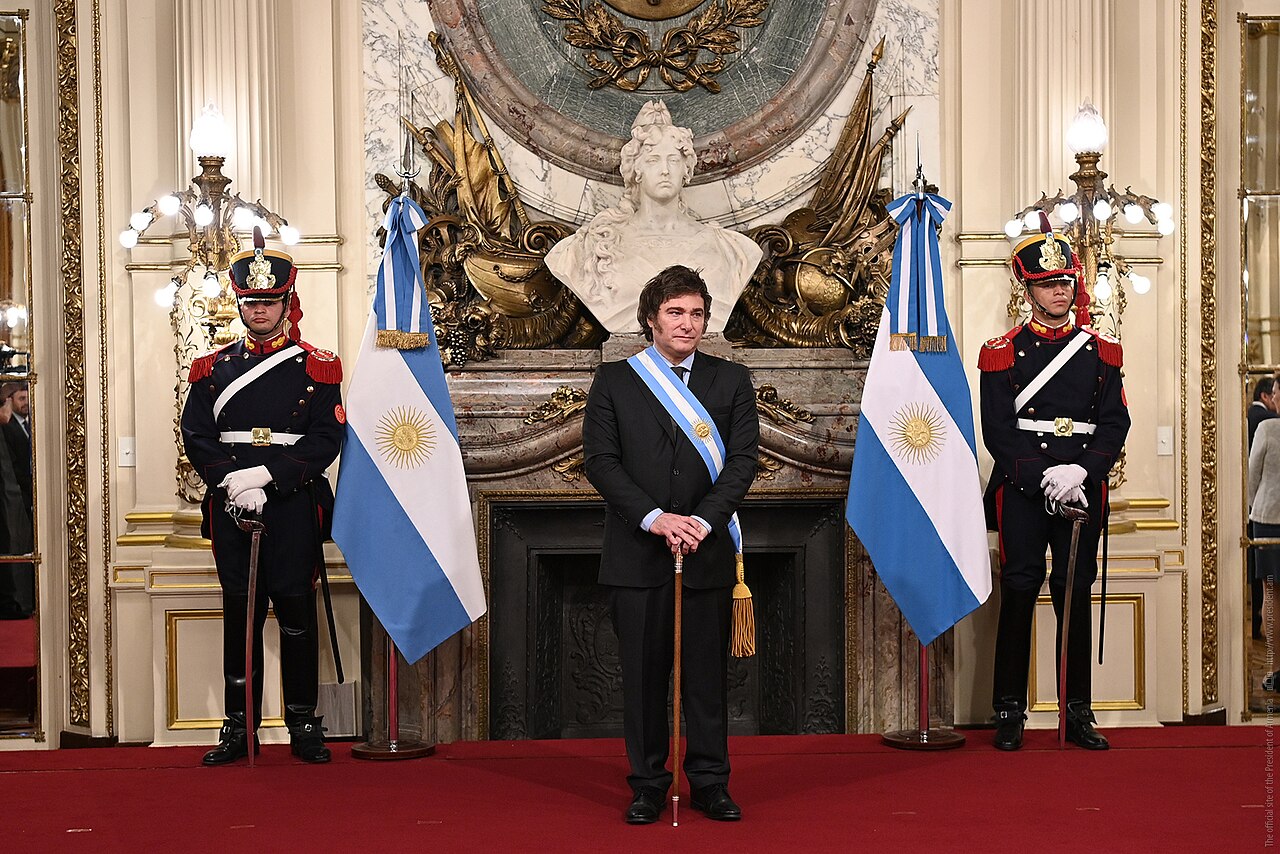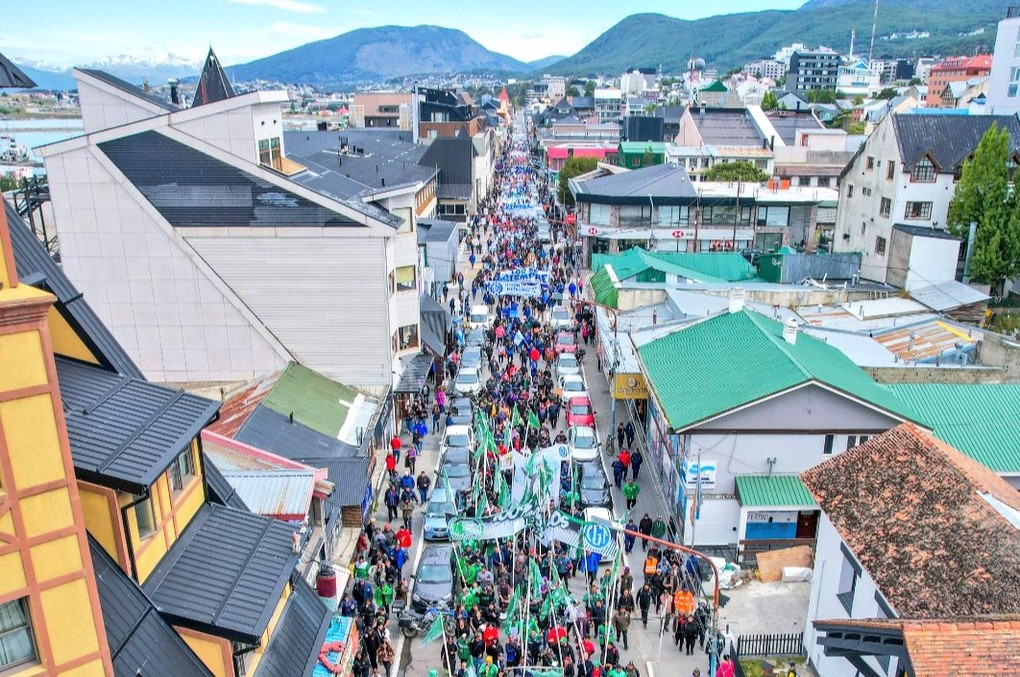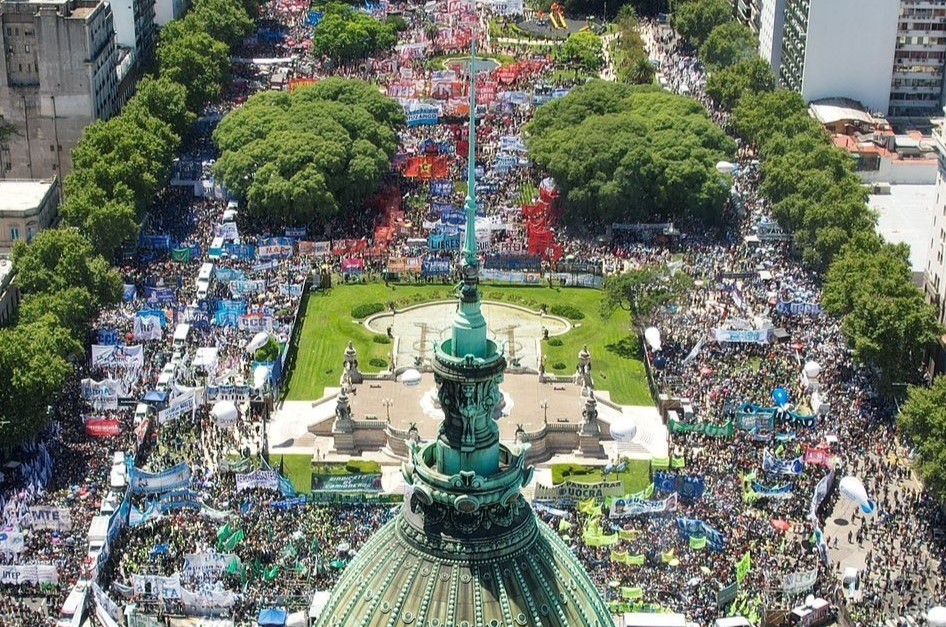1.5 million people marched in Buenos Aires, Córdoba, Rosario, Santiago del Estero, Mendoza, Neuquen, and all the big cities of Argentina to reject the new president Javier Milei’s Necessity and Urgency Decree (DNU) and Omnibus Bill, which represent an all-out ultraliberal assault on workers’ rights and conditions. This is the second massive mobilisation against Milei’s government, which has been in power for fewer than 50 days, and the first general strike called in five years by Argentina’s largest trade union confederations. It provided an outlet for the enormous rage that has built up against this government, and demonstrated yet again the working class’ willingness to fight.
[Originally published in Spanish at argentinamilitante.org]
In Buenos Aires, an immense number of marchers totally blocked the main thoroughfares of Avenida de Mayo and Avenida 9 de Julio, as well as nearby side streets. This is the second time that Security Minister Patricia Bullrich’s “anti-picket” protocol, which was meant to quell protests under the pretext of maintaining free transit, has been shown as only a scrap of paper in the face of events. The mobilisation of the mass workers’ organisations was so huge that the police did not dare intervene heavy-handedly, and consigned themselves to keeping secondary streets open, as well as minor provocations on the periphery.
The 12-hour general strike was called by the General Confederation of Labour (CGT), one of the largest workers’ federations in the world, and adhered to by the two Centrals of Argentinian Workers (CTA de los Trabajadores & CTA Autonoma). Those present included unionised state workers, healthcare workers, and truckers; combative unions led by parties in the left wing FIT-U such as the pneumatics workers union SUTNA; massive piquetero organisations of the unemployed; organisations of retirees; neighbourhood assemblies, which have been spontaneously organising since Milei announced his DNU; Peronist-led and independent social organisations, and the left-wing parties.
Also present were religious groups from poor neighbourhoods, and a swathe of Peronist political leaders. This is symptomatic of the nature of Milei’s measures, which attack the working class primarily but also hurt the interests of much of the petty bourgeoisie and some significant branches of productive industry in favour of the largest monopolies, extractive industries, and imperialism.
Milei dynamiting his support base
Milei’s DNU implemented in one sweep a brutal labour counter-reform, doing away with the right to effectively strike in many industries; increasing job casualisation and reducing payments in case of dismissal; and eliminating sanctions against companies who break labour regulations. At the same time, it sets the stage for the privatisation of the most important state companies (Aerolineas Argentinas, the state postal service and media channels, public nuclear electricity generation, and important navigational routes in the Paraná River); attacks the production of affordable generic medicines in state laboratories; opens mining in glaciers; opens the national market to imports, undercutting national industry; and maintains taxes on exported goods.
 Milei is looking for congress to grant him Bonapartist powers to rule without the approval of the legislative branch / Image: Presidency of Armenia, Wikimedia Commons
Milei is looking for congress to grant him Bonapartist powers to rule without the approval of the legislative branch / Image: Presidency of Armenia, Wikimedia Commons
With his “Omnibus Bill”, Milei is looking for congress to grant him Bonapartist powers to rule without the approval of the legislative branch, and implement his “democratic mandate” without opposition.
These measures are dynamiting his own social base, which has a large component of poor layers, who saw their situation aggravated by the last four years of Alberto Fernandez’s Peronist government managing the capitalist crisis, and voted for a change. But far from stopping inflation and delivering workers salaries in dollars, Milei has set off rampant price inflation of all basic goods and has kept salaries stagnant. Many workers and retirees who voted for him, only to see their living conditions fall dramatically, will be joining the opposition to his government.
In light of the thorough attack on the working class and other layers of society, the corrupt Peronist trade union leaders, in coordination with the Peronist block in congress, were forced to take some action to keep the movement from growing out of their control. This is what the half measure of a 12-hour strike, with no plan for follow up action, represents. Peronist political leaders, having learned something from the revolutionary movement of 2001, have been trying desperately to co-opt the spontaneous neighbourhood assemblies that have appeared in the last month.
The strike was called by the trade union apparatus without being preceded by workplace assemblies to give voice to workers’ basic demands, and without use of the traditional methods of the working class, such as pickets and occupations. The unions of subway and bus workers shamefully kept all transportation services in the city running until 7pm, rather than striking and only transporting protesters to and from the demonstration. The union bureaucrats did not talk of setting up pickets at the entrances to the city to shut down transportation and economic activity generally. This meant that many workplaces stayed open and made it impossible for non-unionised and precarious workers to participate.
Furthermore, the trade union leaders saw the mobilisation as merely a way to put pressure on Peronist politicians and others in parliament not to vote for Mile’s measures, rather than as part of an escalating plan of struggle to use the power of the working class to defeat Milei. This was the main line of the speeches of the CGT leaders in Buenos Aires, who were pleading, almost begging Peronist MPs to vote against the bills.
Despite the partial nature of the mobilisation, the power of the working-class was felt resoundingly throughout the country. After failing to get to hold a vote on the measures before the strike, the vote has been pushed to next week to allow the situation to cool down. On the same day as the strike, a federal labour judge ruled that it is unconstitutional to apply a series of measures from Milei’s DNU. This included the restrictions on the right to strike and measures affecting the collection of union dues, collective bargaining, and the right to hold workplace assemblies.
How to defeat Milei’s attacks
Peronist officials talk of a “cultural defeat” and a “rightward shift” in society to explain why people did not vote for them in the last election, but this massive mobilisation shows that to be pure nonsense. In reality what was shown to fail were their reformist and class-collaborationist policies during the last 12 years of economic downturn. All sectors of the Argentine bourgeoisie can only attempt to solve the capitalist crisis by unloading its effects on the shoulders of the working class and poor, while capitulating before imperialism and continuing to pay the usurious and illegitimate foreign debt. The only way to end the deep social and economic crisis in Argentina is to take the main pillars of the economy under workers’ control in socialist plan of production.
 The working class demonstrated their willingness to fight and gave a taste of their power / Image: Mariana Campos, Twitter
The working class demonstrated their willingness to fight and gave a taste of their power / Image: Mariana Campos, Twitter
The working class demonstrated their willingness to fight and gave a taste of their power to turn the entire political situation on its head.
In order to stop Milei’s austerity programme and defeat his ultra-reactionary government, the working class must lead the movement, with class independence from all capitalist parties and their state. Factory, workplace, school, and neighbourhood assemblies should be spurred and coordinated at the city, regional, and national level to build a perspective of workers’ political power and strike against the capitalists as one. All of the traditional methods of the working class should be employed, such as workplace occupations and direct democracy in assemblies. Only with these methods can we ensure that we have the correct tactics.
In the face of constant degradation and hunger, the working class has no time to lose.
Kick the bureaucracy out of the unions!
No confidence in parliament and courts to stop Milei’s attacks!
Build the struggle for workers’ power!
For a worker’s government!

